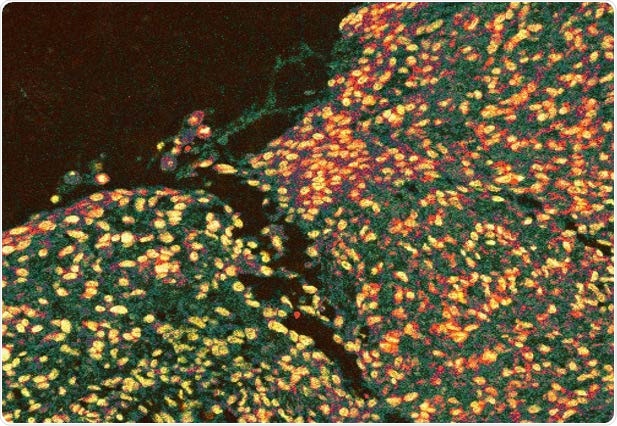Recent research headed by A*STAR’s Institute of Molecular and Cell Biology (IMCB), discovered a protein known as Agrin that is known to promote wound healing and repair when induced after the injury of skin tissue.

Advanced imaging showing sAgrin treated wounded human skin tissue express biomarkers (cyan) while improving skin architecture (green). The nuclei of skin cells are shown in golden. Image Credit: Dr Sayan Chakraborty, Institute of Molecular and Cell Biology (IMCB), A*STAR.
The observations might lead the way for the development of Agrin protein therapy to speed up skin tissue healing for chronic wounds from burns or diabetes. The research was published on November 3rd, 2021, in Nature Communications, a leading scientific journal.
One in 20 Singaporeans experiences chronic wound conditions. The complications associated with the healing of chronic wounds are common in patients suffering from burn injuries or diabetes. They are also the major reason for amputation and decreased emotional wellbeing of the patients.
At the time of injury, a huge chunk of extracellular matrix (ECM)—which aids in tissue rebuilding—is lost, thereby delaying wound healing. However, the timely replenishment of major ECM proteins might speed up wound healing.
In the current research, scientists demonstrated that timely induction or exogenous supplementation of Agrin—an ECM protein—might boost healing of injured skin tissues. Employing both human and pre-clinical models, the researchers discovered that physical injury to the skin tissue increased the expression of Agrin, which conserves the mechanical architecture of injured skin layers by repairing the skin tissue.
The IMCB group along with the Mechanobiology Institute, National University of Singapore also identified that a recombinant fragment of Agrin which can be produced effortlessly—sAgrin—might function as a bio-additive material to enhance healing when used as a topical hydrogel to the injured skin.
These observations could enhance the generation of Agrin-based bio-scaffolds that can provide accelerated skin tissue healing by reinstating the damaged tissue.
We found that in our preclinical wound healing models, Agrin protein therapy offers accelerated healing, compared to collagen gels that are in the market. Besides healing wounds at a faster pace, Agrin therapy preserves the wound microenvironment that enforces better repair mechanisms than existing controls used in the study.”
Dr Sayan Chakraborty, Senior Research Scientist, Institute of Molecular and Cell Biology, Agency for Science, Technology and Research
“The findings offer the potential for developing Agrin-based wound healing biomaterials that could help patients with chronic wounds,” added Dr. Sayan Chakraborty.
Dr. Sayan Chakraborty is the lead researcher of the study.
Recent studies from various labs in the scientific community have implicated a role of Agrin in repair and regeneration of diverse tissues and organs. This study may offer a novel approach for regenerative medicine beyond conventional chronic wound treatments and improve health outcomes.”
Wanjin Hong, Study Senior Corresponding Author, Professor and Executive Director, Institute of Molecular and Cell Biology, Agency for Science, Technology and Research
The scientists intend to expand testing of sAgrin therapy on pre-clinical wound healing models to enhance the efficiency of the research to create bioprinted scaffolds with Agrin that might aid in repairing damaged tissue.
Source:
Journal reference:
Chakraborty, S., et al. (2021) Agrin-Matrix Metalloproteinase-12 axis confers a mechanically competent microenvironment in skin wound healing. Nature Communications. doi.org/10.1038/s41467-021-26717-7.